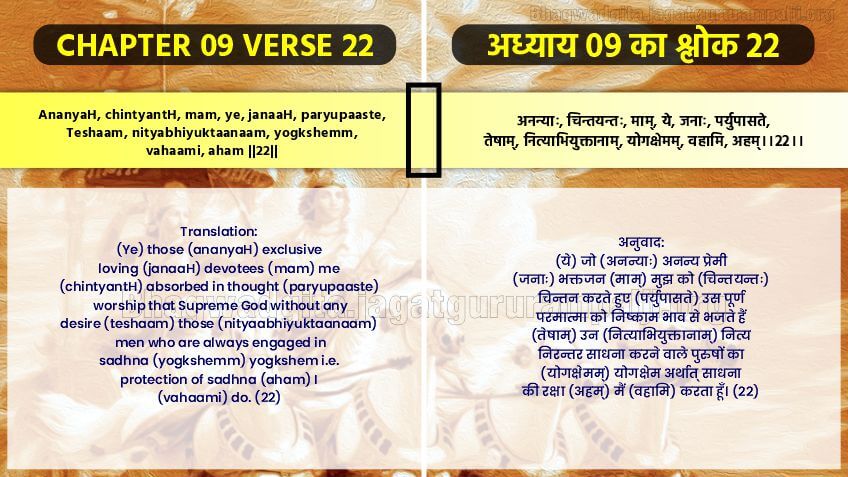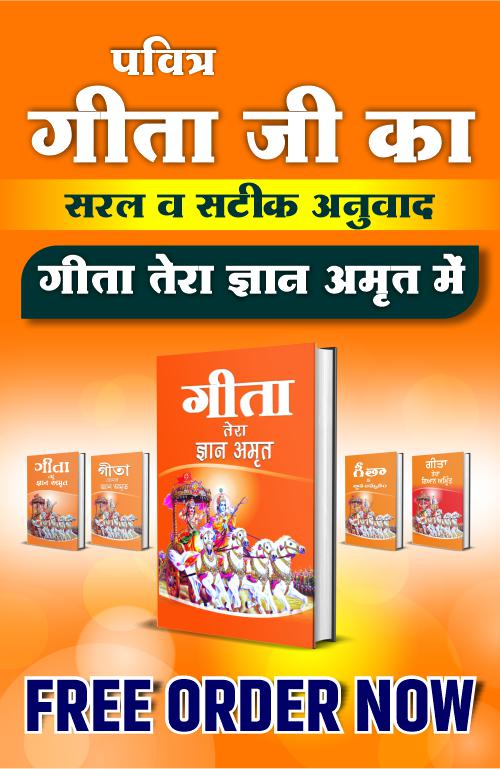
AnanyaH, chintyantH, mam, ye, janaaH, paryupaaste,
Teshaam, nityabhiyuktaanaam, yogkshemm, vahaami, aham ||22||
Translation: (Ye) those (ananyaH) exclusive loving (janaaH) devotees (mam) me (chintyantH) absorbed in thought (paryupaaste) worship that Supreme God without any desire (teshaam) those (nityaabhiyuktaanaam) men who are always engaged in sadhna (yogkshemm) yogkshem i.e. protection of sadhna (aham) I (vahaami) do. (22)
Translation
Those exclusive loving devotees, who absorbed in my thought, worship that Supreme God without any desire, I only protect the sadhna of those men who are always engaged in sadhna.
Meaning
God, the giver of the knowledge of Gita, is saying that one who, in the mantra Om´-Tat´-Sat´ for attaining the Supreme God, while remembering my mantra Om´ worships that God, I only protect his worship.
Important
The other translators have written that “Those exclusive lovers who remembering me worship without any desire.....” Please think: - To remember and worship are pointing towards the same meaning, therefore the translation done by other translators is not justified.
अनन्याः, चिन्तयन्तः, माम्, ये, जनाः, पर्युपासते,
तेषाम्, नित्याभियुक्तानाम्, योगक्षेमम्, वहामि, अहम्।।22।।
अनुवाद: (ये) जो (अनन्याः) अनन्य प्रेमी (जनाः) भक्तजन (माम्) मुझको (चिन्तयन्तः) चिन्तन करते हुए (पर्युपासते) उस पूर्ण परमात्मा को निष्कामभावसे भजते हैं (तेषाम्) उन (नित्याभियुक्तानाम्) नित्य निरन्तर साधना करने वाले पुरुषोंका (योगक्षेमम्) योगक्षेम अर्थात् साधना की रक्षा (अहम्) मैं (वहामि) करता हूँ। (22)
भावार्थ:-- गीता ज्ञान दाता प्रभु कह रहा है कि जो पूर्ण परमात्मा को प्राप्त होने के लिए ओम्-तत्-सत् के मन्त्रा में मेरे ओम् नाम का चिन्तन करते हुए उसे परमात्मा की उपासना करता है। उस की साधना की रक्षा भी मैं ही करता हूँ।
विशेष:-- अन्य अनुवाद कर्ताओं ने लिखा है कि ‘‘जो अनन्य प्रेमी मुझको चिन्तन करते हुए निष्काम भाव से भजते हैं------- विचार करें:-- चिन्तन करना तथा भजना एक ही अर्थ के बोधक है इसलिए अन्य अनुवाद कर्ताओं द्वारा किया अनुवाद न्याय संगत नहीं है।
